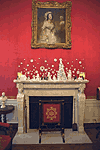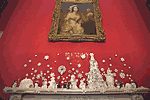 The Green Room is
used throughout the year for small teas and receptions. It also
houses exemplary art, such as the renowned portrait of Benjamin Franklin
by David
Martin, which hangs above the fireplace. On both sides of the handsome
Duncan Phyfe
settee stand two topiaries filled with fresh roses. But it is the
mantelpiece of
the Green Room that is the center of attention, adorned with a creation
by Colette
Peters, a well-known confectionary artist in New York City. This
exquisite display
is an edible Ice Palace made of royal icing and surrounded by a lush Ice
Garden.
The Green Room is
used throughout the year for small teas and receptions. It also
houses exemplary art, such as the renowned portrait of Benjamin Franklin
by David
Martin, which hangs above the fireplace. On both sides of the handsome
Duncan Phyfe
settee stand two topiaries filled with fresh roses. But it is the
mantelpiece of
the Green Room that is the center of attention, adorned with a creation
by Colette
Peters, a well-known confectionary artist in New York City. This
exquisite display
is an edible Ice Palace made of royal icing and surrounded by a lush Ice
Garden.
 The
official White House tree stands in the Blue Room. This year an eighteen-foot
balsam
fir was presented to the President and Mrs. Clinton by Silent Night
Evergreens in
Endeavor, Wisconsin. The tree was given to the White House by Jim and
Diane Chapman
and their children Daniel, David, Julia, Laura and Rachel. The Chapmans
won the honor
after being named the 1998 National Grand Champion Growers by The
National Christmas
Tree Association. The
official White House tree stands in the Blue Room. This year an eighteen-foot
balsam
fir was presented to the President and Mrs. Clinton by Silent Night
Evergreens in
Endeavor, Wisconsin. The tree was given to the White House by Jim and
Diane Chapman
and their children Daniel, David, Julia, Laura and Rachel. The Chapmans
won the honor
after being named the 1998 National Grand Champion Growers by The
National Christmas
Tree Association.
The Blue Room Tree is decorated with interpretations celebrating Winter
Wonderland
from artists across the nation. Snowmen from all fifty states were made
by
individuals recommended by the Governor of each state. The warmth of the
room is
captured with knitted mittens and hats from members of The Knitting Guild
of America,
and the thrill of winter sports is depicted in colorful wooden ornaments
made by artists
from the Society of Decorative Painters. The green velvet handmade tree
skirt was
designed by individuals from each of the fifty states, territories and
the District
of Columbia in celebration of the Clinton family's first holiday season
at the White
House.
  The dramatic Red Room
features Colette Peters's second confectionary masterpiece, a
Polar Bear Christmas at the North Pole complete with an igloo, penguins,
snowflakes,
icicles and a snow tree with ice cube presents. The traditional cranberry
tree sits
atop the most important piece of American Empire furniture in the White
House
collection,
the marble top center table made in New York around 1810 by Charles-Honore
Lannuier.
The dramatic Red Room
features Colette Peters's second confectionary masterpiece, a
Polar Bear Christmas at the North Pole complete with an igloo, penguins,
snowflakes,
icicles and a snow tree with ice cube presents. The traditional cranberry
tree sits
atop the most important piece of American Empire furniture in the White
House
collection,
the marble top center table made in New York around 1810 by Charles-Honore
Lannuier.
|